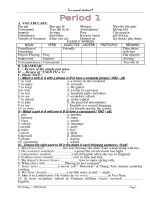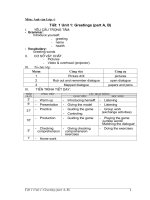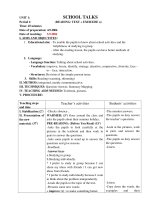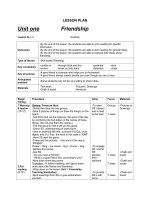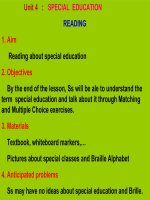Unit 1 & 2
Bạn đang xem bản rút gọn của tài liệu. Xem và tải ngay bản đầy đủ của tài liệu tại đây (60.86 KB, 9 trang )
THE PRESENT SIMPLE, THE PRESENT PROGRESSIVE, THE
PRESENT PERFECT
I. The Present Simple Tense
1. Form to be
- Affirmative: S + V1…. S + am/is/are……
- Negative: S + do/does + not + V… S + am/is/are + not…
- Interrogative: Do/Does + S + V….? Am/Is/Are + S ….?
2. Use
a. Diễn tả một hành động hoặc một thói quen ở hiện tại (always, usually,
often, sometimes, occasionally, seldom, rarely, every…….)
Ex: I usually go to school in the afternoon.
b. Diễn tả một chân lí, một sự thật lúc nào cũng đúng.
Ex: The earth moves around the sun
3. Đối với ngôi thứ ba số ít: He, She, It.
a. Thêm “S” vào sau động từ thường.
Ex: Lan often gets up early in the morning.
b. Thêm “ES” vào sau các động từ tận cùng là: ch, sh, s, x, o, z.
Ex: He watches a lot of TV on Sundays.
II. The Present Progressive Tense
1. Form
- Affirmative: S + am/is/are + V-ing……
- Negative: S + am/is/are + not + V-ing…
- Interrogative: Am/Is/Are + S + V-ing ….?
2. Use
Diễn tả một hành động đang xảy ra trong lúc nói (now, at the moment, at
this time, at present….)
Ex: - I am looking for the latest newspaper now.
- They are watching a sport game show at the moment.
3. Note:
Một số động từ không dùng ở thì Present Progressive, mà chỉ dùng ở thì
Present Simple: to be, to want, to need, to have (có), to know, to
understand….
Ex: - We are tenth-grade students now.
- I understand the lesson at the moment.
III. The Present Perfect Tense
1. Form
- Affirmative: S + has/have +V3/ed….
- Negative: S + has/have + not + V3/ed…
- Interrogative: Has/Have + S + V3/ed….?
2. Use
a. Diễn tả một hành động xảy ra trong quá khứ và kéo dài đến hiện tại
(never, ever, not…yet, since, for, so far, until now, up to now,…….)
Ex: We have learnt English for 5 years.
b. Diễn tả một hành động vừa mới xảy ra (just, recently, lately).
Ex: She has just gone out.
c. Diễn tả một hành động xảy ra trong quá khứ không xác đònh rõ thời
gian (already, before)
Ex: Have you seen this movie before?
3. Notes
a. Cách dùng của since và for
- SINCE: chỉ mốc thời gian (2000, September, I last saw you, …)
- FOR: chỉ khoảng thời gian (3 months, a long time, ages, …)
b. S + has/have +V3/ed…… since + S + V2/ed….
Ex: We have known each other since we worked in this factory.
c. Các trạng từ: never, ever, just, already thường đứng giữa trợ động từ
(has/ have) và động từ chính (V3/ed).
Ex: I have already finished my homework.
EXERCISES
Put the verbs in parentheses into the correct tense:
1. He (practice)_______________ the piano every day.
2. I (believe)____________ you.
3. Bob (see)______________ this movie before.
4. Jorge (read)____________ the newspaper already.
5. Maria (have)_____________ a cold now.
6. He (swim)_____________ right now.
7. Mr. Johnson (work)____________ in the same place for 35 years.
8. We (not begin)_____________ to study for the test yet.
9. John (hate)____________ smoke.
10. Jill always (get up)____________ at 6.00 a.m.
11. Joan (travel)___________ around the world.
12. We (not see)_____________ this movie yet.
13. Terry (mow)__________ the lawn yet.
14. John and I (be)______________ pen pals for nearly 3 years.
15. Maryam (stay)____________ with us at the moment.
16. He (wear)___________ the same coat since he (move)___________
here.
17. I (not see)_____________ your brother recently.
18. Listen to those people! What language they (speak)___________?
19. It (not rain)______________ much in our country in winter.
20. I never (talk)_____________ to such an interesting person.
THE PAST SIMPLE, THE PAST PROGRESSIVE
AND THE PAST PERFECT
I. The Past Simple Tense
1. Form to be
- Affirmative: S + V2/ed…. S + was/were……
- Negative: S + did + not + V… S + was/were + not…
- Interrogative: Did + S + V….? Was/Were + S ….?
2. Use
a. Diễn tả một hành động xảy ra trong quá khứ xác đònh rõ thời gian
(yesterday, ago, last……, in the past, in 1990)
Ex: - My father bought this house 10 years ago.
- Mr. Nam worked here in 1999.
b. Diễn tả một loạt các hành động xảy ra liên tiếp trong quá khứ.
Ex: - Last night, I had dinner, did my homework, watched TV and went to
bed.
- When she came here in 1990, she worked as a teacher.
II. The Past Progressive Tense
1. Form
- Affirmative: S + was/were + V-ing….
- Negative: S + was/were + not + V-ing…
- Interrogative: Was/Were + S + V-ing….?
2. Use
a. Diễn tả một hành động xảy ra ở một thời điểm trong quá khứ.
Ex: They were playing chess at 4 o’clock yesterday.
b. Diễn tả một hành động đang xảy ra có một hành động khác xen vào
trong quá khứ (when, while, as). Hành động đang xảy ra dùng thì Past
Progressive, hành động xen vào ra dùng thì Past Simple.
Ex: - I was studying my lessons when he came.
- We saw him while we were walking along the street.
III. The Past Perfect Tense
1. Form
- Affirmative: S + had + V3/ed….
- Negative: S + had + not + V3/ed…
- Interrogative: Had + S + V3/ed….?
2. Use
a. Diễn tả một hành động xảy ra trước một thời điểm trong quá khứ.
Ex: By the end of last month, she had made 4 skirts.
b. Diễn tả một hành động xảy ra và hoàn thành trước một hành động khác
trong quá khứ (before, after, by the time). Hành động xảy ra trước dùng thì
Past Perfect, hành động xảy ra sau dùng thì Past Simple.
Ex: - After Nam had done his homework, he went to bed.
- They had lived in Dong Thap before they moved to HCM city.
THE FUTURE SIMPLE + EXERCISES
The Future Simple Tense
1. Form
- Affirmative: S + will/shall + Vo….
- Negative: S + will/shall + not + Vo…
- Interrogative: Will/Shall + S + Vo….?
(will not = won’t; shall not = shan’t)
2. Use
Diễn tả một hành động xảy ra ở tương lai (tomorrow, in the future,
next… ), không có dự đònh trước.
Ex: It will rain tomorrow.
3. Notes
a. Trong câu nghi vấn, chúng ta chỉ dùng Shall I/Shall We… ?
Ex: Shall we go out for a dinner tonight?
b. be going + Vo: Dieón taỷ moọt dửù ủũnh ụỷ tửụng lai.
Ex: I am going to play volleyball on Sunday.
EXERCISES
Put the verbs in parentheses into the correct tense:
1. They (drive)______________ to school tomorrow.
2. Gene (eat)____________ dinner when his friend called.
3. At three oclock this morning, Eleanor (study)______________.
4. John (write)________________ his report last night.
5. After John (wash)_____________ his clothes, he began to study.
6. Tim (go)____________ to France last year.
7. When the teacher (enter)___________the room, the students were talking.
8. We (hold)_____________ a soccer match next Sunday.
9. Guillermo (call)_____________ his employer yesterday.
10. Jane sent a letter to his university after she (receive)___________ her
scholarship check
11. The car (flip)______________ ten times before it landed on its roof.
12. While Joan was writing the report, Henry (look)_____________ for more
information.
13. What you (do)______________ last weekend?
14. Mr. and Mrs. Ba (take)____________ some beautiful photos a few days
ago.
15. Her brother (talk)_____________ to his pen pal on the phone at the
moment.
16. They (not contact)_______________ to each other for a long time.
17. Nothing (be)______________ done since I moved here.
18. I used to walk to school when I (be)_______________ in primary school.
19. He (go)_______________ to that book shop tomorrow.
20. Lan (drink)_____________ two bottles of water every day.
21. She (be)__________ a Vietnamese student. She (be)___________ born
in Ho Chi Minh city. She (go)______________ abroad last year to study
English. She (learn)______________ French before she began to study
English. She (make)_____________ great progress since she
(get)______________ there. Next month, she will take the final exam. She
(be)_____________ able to get a good job when she (return)_____________
to Vietnam.
Choose the best option that best completes each sentence:
1. My friend_____________ to the museum last weekend.
A. goes B. went C. had gone D. have gone
2. Thu and Lan______________ close friends for years.
A. are B. were C. had been D. have been
3. Our Singaporean friends_______________ to visit our school last year.
A. is coming B. come C. came D. have come
4. We_____________ Malaysia last summer.
A. visited B. were visiting C. are visiting D. have visited
5. The students used to______________ football in that stadium.
A. played B. play C. playing D. are playing
6. Her parents want him_______________ some good books to read.
A. to choose B. choose C. chose D. choosing
7. Would you like_____________ and visit my country?
A. come B. coming C. to come D. came
8. The children______________ their parents for a long time.
A. didn’t see B. haven’t seen C. don’t see D. haven’t see
9. I and Kenny____________ penpal friends since I____________
Singapore.
A. are-visit B. were-visited C. have been-visited D. were-have visited
10. My children are lucky_____________ the chance to visit the capital
again.
A. have B. having C. are having D. to have
11. The children enjoy______________ with their friends through
computers.
A. to chat B. chat C. chatting D. chatted
12. Her father used to_______________ abroad for his business.
A. travelling B. travelled C. travel D. is travelling
13. The kids_____________ that show before.
A. didn’t see B. don’t see C. aren’t seeing D. haven’t seen
14. How often______________ you______________ sports? –Twice a week.
A. did-play B. have-waited C. do-play D. did-played
15. How long_______________ you_____________ for me?-For an hour.
A. did-waited B. do-wait C. have-waited D. have-wait
16. Since the worldwide recession of the 1990’s, the sail of jeans
__________ growing.
A. stopped B. was stopped C. was stopping D. has stopped
17. In some countries, ______________ uniforms is compulsory in schools.
A. wear B. to wear C. wearing D. wore
18. Vietnamese women_______________ very proud of their ao dai.
A. are B. were C. had been D. have been
19. Vietnamese women can continue___________ the unique and
fashionable “ao dai”.
A. to wear B. wear C. wore D. wearing
20. Ba said he______________ some good marks last semester.
A. gets B. got C. getting D. have got
21. They asked me how many children_______________ .
A. I had B. had I C. I have D. have I
22. Thu said she had been_____________ the day before.
A. here B. there C. in this place D. where
23. You should practice_____________ English to talk to your foreign
friends.
A. to speak B. speak C. spoke D. speaking
24. My friends practice_______________ to the radio every day.
A. listening B. are listening C. listen D. to listen
25. _____________ television is also a means of learning English.
A. Watch B. Watching C. To watch D. Watched
26. You should______________ a lot of grammar exercises if you want to
improve your writing.
A. did B. doing C. done D. do
27. Chinese is a difficult language_______________ .
A. to learn B. to be learnt C. to be learning D. to learning
28. The student said that the English test_____________ the most difficult.
A. is B. was C. will be D. have been
29. They told their parents that they______________ their best to do the test.
A. try B. will try C. are trying D. would try
30. Don’t forget_______________ your dictionary with you to class.
A. to bring B. bring C. bringing D. to bringing
31. Her classmates started_____________ when she won the race.
A. to shout B. shouting C. shout D. shouted
32. You should remember______________ your warm clothes when it’s
cold.
A. to wear B. wearing C. wear D. are
wearing
33. The students stopped__________ when the teacher entered the
classroom.
A. to talk B. talk C. talked D. talking
34. There is more population in the city_____________ there is more traffic
in the streets.
A. and B. because C. but D. although
35. The kids didn’t go to the movie last night______________ it rained so
heavily.
A. and B. but C. because D. although
36. _______________ it’s rainy, I walk home with my umbrella.
A. When B. But C. Because D. Though
37. Lan suggested_____________ to the zoo at weekend.
A. goes B. went C. going D. to go
38. This movie is not interesting. How about______________ to the concert?
A. to go B. going C. go D. went
39. You should_______________ more books on UFO if you want to know
about life on other planets.
A. reading B. read C. to read D. have read
40. They _____________ their friend at the airport tomorrow.
A. will see B. have seen C. saw D. see
41. What were you doing when he_____________?
A. comes B. to come C. came D. coming
42. There used__________a movie theater here,but it closed a long time
ago.
A. be B. to be C. being D. have been
43. I_______________ English here since I graduated from university.
A. teach B. taught C. have taught D. am teaching
44. He used to_____________ full time, but now he is a part time worker.
A. work B. working C. worked D. is working
45. Let’s______________ somewhere for a drink!
A. go B. to go C. going D. went
46. She said that she_______________ learning English with you.
A. like B. to like C. likes D. had liked
47. She asked me where I_____________ from.
A. come B. coming C. to come D. came
48. She______________ me whether I liked classical music or not.
A. ask B. asks C. asked D. asking
49. He asked me who the editor of that book____________ .
A. was B. were C. is D. has been
50. He wants to know whether I_____________ back tomorrow.
A. come B. came C. will come D. would come
51. I wonder why he______________ love his family.
A. doesn’t B. don’t C. didn’t D. hasn’t
52. I remember_______________ her somewhere.
A. see B. seeing C. saw D. to see
53. She forgot_____________ off the gas before going out.
A. turn B. turning C. to turn D. turned
54. I suggest______________ money for the poor people in our
neighborhood.
A. save B. to save C. saving D. saved
55. He got wet_____________ he forgot his umbrella.
A. because of B. because C. but D. and
56. We____________ since we left school.
A. don’t meet B. didn’t meet C. won’t meet D. haven’t met
57. ______________ laugh at me.
A. Didn’t B. Won’t C. Don’t D. Haven’t
58. Tidal waves_______________ the result of an abrupt shift in the
underwater movement of the Earth.
A. are B. were C. is D. was
59. My parents do not allow me___________, so I had to stay home.
A. go B. to go C. going D. gone
60. Do you think you will be able______________ a space trip?
A. take B. to take C. taking D. taken
